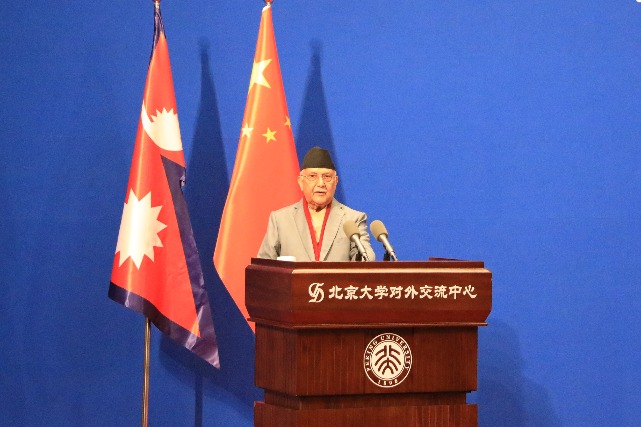Chinese solution on land degradation wins applaud

Building on mature big data and artificial intelligence technologies, Chinese scientists have developed a targeted system for land degradation management on the Arabian Peninsula, which can be used to support governance decisions in the region, an expert said.
At the ongoing 16th session of the Conference of the Parties of the United Nations Convention to Combat Desertification in Riyadh, Li Xiaosong and his team from the Chinese Academy of Sciences' Aerospace Information Research Institute showcased the system, garnering interest from representatives of several countries.
"We are using big data to support the achievement of sustainable development goals," he said, adding that they are generating models and algorithms to facilitate governance decisions of policymakers.
To build these models and algorithms, the scientists first generated a large database, including remote-sensing data, ground observation data and reports from various regions, and then combined it with over 40 years of China's desertification control experience and various new technologies, Li said.
Since COP16 opened in the Saudi capital on Dec 2, Li has showcased the system both at the China Pavilion and during multinational discussions.
Through a mobile application called LDN Tracker, users can select any location and the platform will provide information about the area's land status, including historical evolution, production capacity, as well as climate conditions such as precipitation and temperature.
The system can provide precise recommendations for policymakers based on the type of degradation, whether it is wind erosion, water erosion or erosion caused by salinization, Li said.
"In August, Saudi Arabia invited us to conduct a training session to discuss how to use China's sand management experience and its science and technology," he said.
Now, in approximately one-third of Saudi Arabia's southwestern region, the system will be introduced, along with Chinese machinery and automation technology, among other things, to carry out land management and afforestation, he added.
The Chinese solution developed by Li and his team has received warm welcome at COP16.
Amos T. Kabo-Bah, from the University of Energy and Natural Resources in Ghana, wrote in an email sent to Li that the innovative system for achieving land degradation neutrality in the Arab region has made a strong impression on him.
"We are reaching out to propose a detailed discussion on potential areas for collaboration," Kabo-Bah wrote.
Cesar Luis Garcia, an innovation technologist from Argentina, said in a separate email sent to Li that he and his team are "deeply impressed" by the system and the comprehensive report on achieving land degradation neutrality in the Arab region.
"Your initiative demonstrates an inspiring commitment to tackling land degradation challenges, and we believe it has tremendous potential for broader impact," Garcia wrote.
Li said he has received numerous such emails requesting cooperation since the system was presented at COP16. "To develop such a globally leading system, we have taken advantages of China's experience in desertification control over 40 years and the development in remote-sensing big data," he added.
In 1978, China initiated the Three-North Shelterbelt Forest Program in 13 northern provinces and regions, implementing tailored afforestation, sand fixation and ecosystem restoration methods. Currently, the forest coverage in the project area has increased from around 5 percent in the 1980s to nearly 14 percent.
China became a signatory to the United Nations Convention to Combat Desertification in 1994.
Guan Zhi'ou, head of the Chinese delegation to COP16 and director of the National Forestry and Grassland Administration, said that China has already achieved some of UN's 2030 Sustainable Development Goals ahead of schedule, including achieving a double reduction in desertification and sandy land, becoming the first country to achieve the goal of zero net growth in land degradation.
"China now boasts the world's largest area of planted forests and is the biggest contributor to global greening," Guan said.
Hussein Nasrallah, an official at Lebanon's Ministry of Agriculture, said in an interview with China Daily on the sidelines of COP16 that people in his country want to transform almost desert-like and once-barren areas into green spaces, which is not an easy task.
"We have witnessed how China has addressed land degradation and other global environmental issues. China is showing the world how to effectively tackle these problems, and we can learn from its approach," he said.
Nasrallah said he hopes that more countries, Lebanon in particular, can cooperate with China to address the issue of desertification.
"China came to us and showed us how these technologies can help solve problems. In dry areas with little water, they use plants that can survive with almost no water. Some of these plants even produce flowers and fruits, bringing profits for the locals, which is amazing. These are very important and brilliant solutions," he added.
- Chinese solution on land degradation wins applaud
- Macao taps advantages to help TCM go global
- China's legendary Mt. Qomolangma climber Gonpo passes away at 91
- Book of Xi's discourses on upholding, improving people's congress system published
- China, ASEAN launch joint initiative to develop cultural, tourism exchanges
- Chinese researcher taps large language models to make TCM drug more innovative, productive




































